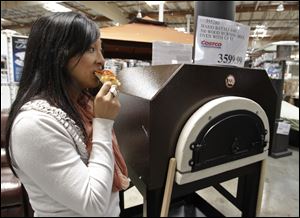
'Treasure hunt' yields profits
Merchants rely on the unexpected
7/6/2011
A shopper at Costco in Mountain View, Calif., munches on pizza beside an oven priced at $3,599.99. The warehouse chain offers limited-time specialty items in hopes of attracting impulse spending .
Specialty grocery chain Trader Joe's might not have the cheapest toilet paper or the most varieties of ketchup, but it hooks customers with mango butter, chocolate-covered pomegranate seeds, and cilantro-and-jalapeno hummus.
These goodies aren't on most grocery lists, but they're eye-catching enough to tempt shoppers into an impulse buy. At a time when families are watching dollars and the Web makes discount-hunting easy, unexpected treasures are an increasingly important strategy for stores.
"It's the wow factor that's getting people to buy," says Wall Street Strategies analyst Brian Sozzi. "You walk into Costco for tuna and end up getting a Marc Jacobs coat."
So shoppers may go into T.J. Maxx or a DSW shoe store looking for a bargain on something they need but end up splurging on irresistible finds, from dirt-cheap Ray-Ban sunglasses to half-priced Puma sneakers.
Dollar Tree lures customers with rock-bottom prices on cleaning supplies, then tempts them with extras such as leather iPod cases. And at Costco, tucked inside the hulking pallets of mayonnaise and paper towels is a section where shoppers never know what they'll find.
Costco has been using the term "treasure hunt" for years to explain why up to a fifth of its stock is limited-quantity items that are in the store for as little as a week. Sometimes it's seasonal merchandise, such as margarita machines in summer. Often it's surprisingly trendy -- such as bargain-priced Hunter rain boots, sold almost exclusively in the United States by Nordstrom.
Revenue at U.S. Costco stores open at least a year was up 10 percent last quarter from last year, with strong growth in nonessentials such as jewelry and home and garden.
Wal-Mart Stores Inc., on the other hand, is still trying to correct itself after a move to pare down to the basics -- the opposite of the treasure hunt approach -- proved unsuccessful.
Constantly cycling in fresh merchandise is critical as the Web makes it harder for stores to compete on price. Surprises also create suspense and encourage repeat visits.
TJX Cos., parent company of T.J. Maxx and other chains that sell designer goods at a discount, gained momentum during the recession, when frugality came into style. That growth is continuing. First-quarter revenue at Marshalls and T.J. Maxx stores open at least a year was up 4 percent over the same period last year.
The quick turnover creates a sense of urgency: If you don't buy it today, it probably won't be here tomorrow. When the economy tanked, TJX began cycling inventory through the store faster than ever before, Sherry Lang, vice president of investor relations at TJX, said.
Superstores like Kmart and Walmart are getting stung by online competition. Any mass-market product -- think Jif peanut butter or Hanes T-shirts -- can be comparison-priced online, and people tend to buy from the cheapest source. Increasingly, that's a Web retailer.
But stores such as T.J. Maxx and Marshalls often pick up products that have been discontinued, said Michael Dart, co-author of the book The New Rules of Retail. Shoppers probably won't find them for less -- or at all -- online.